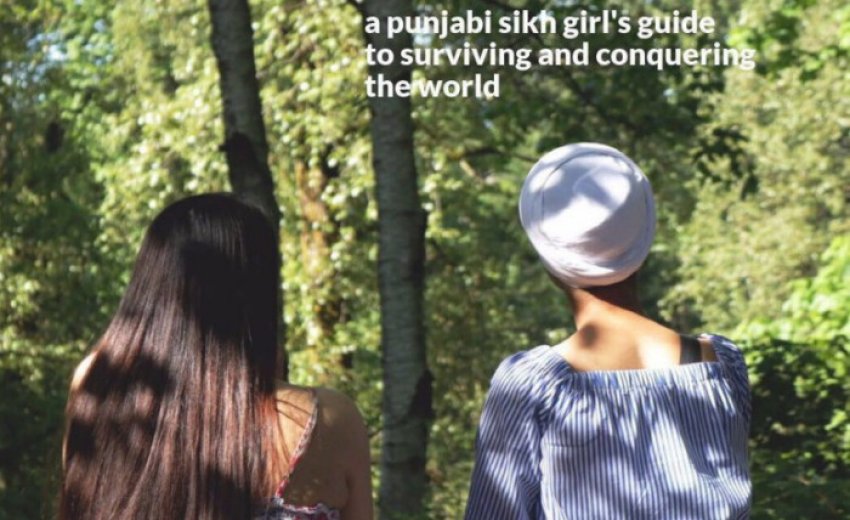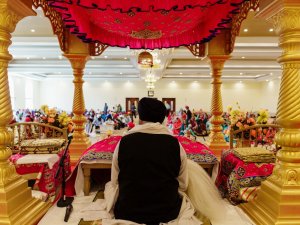Have you ever struggled with what it means to be a Kaur? A Punjabi girl? What about what it means to be both (as both are not necessarily connected). These are questions that many girls will contemplate, and sometimes even struggle with, at many different stages of their lives. Questions, such as: “Am I Punjabi or Sikh enough?” will erupt, causing emotional and mental distress. A question to ponder on is: “Why is this so stressful?” Why is it that these questions on identity can feel so suffocating, especially when the identity of a Kaur is supposed to be liberating? The answers lie in the community and culture that we are raised in; they both play a huge role in the way that we see the world, and in the way that the world perceives us. Sometimes this impacts us positively, but unfortunately, they can impact us in a negative way as well.
Although we may not be aware of it, there are Kaurs everywhere who are internally and externally struggling with aspects of their lives and identity. Some Kaurs may feel like they are not “Sikh enough”, because they do not fit the image of a Kaur that society expects to see. Some Kaurs will struggle with the stigma that is associated with keeping their kes. Whatever the struggle may be, it is clear that a Kaur is a complex, multi-dimensional person. Just like no two people are exactly the same, no two Kaurs are exactly the same; our own experiences and environments, which are usually different from one another’s, shape us all.
In a world that tries to police and regulate our bodies, minds, and Sikhi, here are some ways to conquer and survive.
1. Realize that it is okay to breakdown.
The strongest of women break sometimes, and you must remind yourself that it is okay if you do, too. Whether it’s a loved one who is too far, a failed friendship, or a feeling of disconnection from your Guru, anything that destroys your inner peace is a valid reason to breakdown. Do not bottle up your emotions, and definitely do not be afraid to cry. Sometimes, it feels like there is a lot of weight on our shoulders, simply because we are Punjabi Sikh girls. We carry the weight of our family’s honour (something we never asked to carry), and the weight of society’s expectations. Every day stressors, such as school or work, add even more weight. Remind yourself that it is okay to breakdown, to crumble. This is how you will build yourself up again.
2. Learning to be content with your solitude.
Nobody can ever know exactly what pain you are feeling, because they can never be present in your body and mind. They can sympathize or empathize with you, but they will never really know exactly what you are going through. This is why it is very important that you are being honest with yourself, admitting you are suffering, and taking steps to heal. There is no human out there who knows you better than you know yourself. This is why YOU are one of the best people to help yourself to recover. If you have a method of healing, such as writing, running, lifting weights, etc., that does not require you to need someone there with you constantly, this is your power. Do not forget that it is valid to need your best friend or your partner to be there for you when you are hurting. However, the truth is that they can only try to imagine what you are going through, and will never know exactly how it feels to be in your shoes.
Do not romanticize your pain; trauma is not a flowery poem. Get to the root of what hurts. Whatever your passion is, chase it. We may not always be able to run, lift, or write all of the pain away, but we can make sure we don’t completely break.
3. Staying close to your roots.
If you are a child of the diaspora, you will understand what it means to struggle with your identity. Should we identify with the culture of the country our parents immigrated to, and forget about our roots in Punjab?
Punjabi culture and Sikhi are not the same thing, although many people tend to think this way. Punjabi culture glorifies caste and is drenched with misogyny, things that being Sikh and Kaur liberate us from. However, it is also important to realize that some aspects of it are connected. We need to learn how to read and write Gurmukhi to be able to do our Nitnem. Punjab is the land where our Gurus planted seeds of Sikhi, and where countless Singhs and Kaurs gave shaheedi for our kaum. It is important to not forget who we are, and where we come from. Stay close to your roots, learn your history and your language, and wear your Punjabi suits and phulkaris, but also remember that staying close to your roots goes above and beyond physicality. Decolonize your mind and your body, recognize the oppression of your people by the Indian state, and don’t forget to also find out who the land, on which you reside now, belongs to.
Someone once said that even the largest of trees can be brought down if one hits it at the roots hard enough. Your Punjabi roots are your foundation. Remember who you are and never forget it.
4. Coping with your period.
Every Kaur experiences and deals with her period differently, but one thing most of us can relate to is the stigma that surrounds this natural process of our body. While it is very important to take care of yourself physically during your period, such as drinking lots of water, monitoring your iron levels, using heat pads for the pain, how do we take care of our mental health during this time?
Why is it that a woman is deemed to be “dirty” or “impure” when she is on her period? Why is it, that if a woman is on her period, she will destroy the sanctity of a holy place? Many times, when Kaurs are discussed in the context of Sikh history, her role as a mother will be glorified. She will always be referred to as somebody’s mother or sister first, before her own independent selfhood and sovereignty. As if a Kaur’s biggest contribution to Sikhi is just to give birth. However, the greatest irony comes from the fact that, although motherhood is glorified, the process through which this motherhood is attained requires a woman to be able to menstruate, a topic that is stigmatized in our community.
Kaurs who are mothers are held to a high standard only because they are able to produce a child, but they see the biology of a woman as impure and disgusting. You must learn to see your period as something that is not disgusting, but as the natural biology of your body that was created by Guru Sahib. Remember, what makes a person dirty is not the physical body:
ਮ: ੧॥
ਜਿਉ ਜੋਰੂ ਸਿਰਨਾਵਣੀ ਆਵੈ ਵਾਰੋ ਵਾਰ ॥
Just as a woman has her period, month after month
ਜੂਠੇ ਜੂਠਾ ਮੁਖਿ ਵਸੈ ਨਿਤ ਨਿਤ ਹੋਇ ਖੁਆਰੁ ॥
So does falsehood dwell in the mouths of the false; they suffer over and over again.
ਸੂਚੇ ਏਹਿ ਨ ਆਖੀਅਹਿ ਬਹਿਨ ਜਿ ਪਿੰਡਾ ਧੋਇ ॥
They are not pure, the ones who sit down after merely washing their bodies.
ਸੂਚੇ ਸੇਈ ਨਾਨਕਾ ਜਿਨ ਮਨਿ ਵਸਿਆ ਸੋਿੲ ॥੨॥
Only they are pure, says nanak, within whose minds abides the Guru.
Guru Nanak Sahib, Ang 472
5. Reaching out to your Guru.
There will be some times when you feel a disconnection from Guru Sahib, whether it is because of the day-to-day struggles of your human life that are distracting you from them, or sometimes for reasons you can’t explain. Whatever the reason may be, it might feel like something is breaking inside of you in these moments. You have to remind yourself, that although you have forgotten the Guru, the Guru can never forget you.
We are all complex human beings with complex realities that will never be exactly alike. We can try to empathize with each other, but we will never know exactly how it feels. This is where your Guru comes in. Guru Ji is anterjami (all-knowing). They know about the mess of thoughts inside of your head. They know about the pain you are feeling. Your pain is what will bring you to your Guru. This is why gurbani says:
ਦੁਖੁ ਦਾਰੂ ਸੁਖੁ ਰੋਗੁ ਭਇਆ ਜਾ ਸੁਖੁ ਤਾਮਿ ਨ ਹੋਈ ॥
“The happiness is the disease because it takes you away from the Guru, but sadness is the medicine because it brings you back to the Guru,”
Guru Nanak Sahib, Ang 469.
Every Sikh, whether they are a Singh or a Kaur, has an equal right to Guru Sahib. Guru Sahib can be your confidant and your sanctuary. How can you reach out to them, though?
Find them in the people you see everyday, find them in your sangat, find them in gurbani, kirtan, gatka, and most importantly, find them in yourself:
ਮਨ ਤੂੰ ਜੋਤਿ ਸਰੂਪੁ ਹੈ ਆਪਣਾ ਮੂਲੁ ਪਛਾਣੁ ॥
“Oh my mind, you are an embodiment of light, recognize your own roots/source,” Guru Amar Das Sahib, Ang 441.
6. The beauty of choice.
Being able to choose how to live your life is a beautiful thing, it is what is best for your mental health. Being able to choose Sikhi is also a beautiful thing. You will come across individuals in your life who are forced into Sikhi, and also individuals who are not encouraged to walk on the path of Sikhi.
Look at everyone around you and recognize that they are on their own personal journey of finding the Guru, and that their physical appearance is not a reflection of their soul. When it comes to Sikhi, we as a community tend to put Amritdhari women on a pedestal, while we put down our sisters who have not yet accepted Amrit. Realize that Sikhi is a journey, and not a destination. Accepting Amrit and looking a certain way does not mean you have reached your destination. Although, no one can ever deny that Guru Gobind Singh Ji blessed his Sikhs with a distinct and sovereign identity, we must also respect that the Sikhs around us are on their own journey; we must not deter them from the path by putting them down.
7. The power of sisterhood.
There is nothing more empowering than seeing a fellow sister succeeding in a world that wants to tear her down. As women, we know of the challenges we face, and we can empathize with one another. We can empower each other. We can heal each other.
I urge every single one of you to think about the Kaurs in your life that inspire you. Now think of all the kaurs you may have put down in your life. Reach out to them. Break the tension and fill it with compassion and understanding. Sisterhood is so powerful. When a Kaur knows that she is not alone because of the amazing women around her, she will feel empowered.
Written by: Harman Kaur (@__harmankaur)
Photography: Lovepreet Kaur (@___la_photography)
In Photographs: Harman Kaur & Gurpreet Kaur (@gsangha2)






